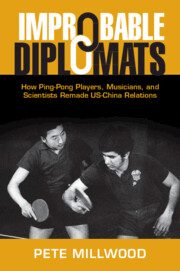Book contents
- Improbable Diplomats
- Cambridge Studies in US Foreign Relations
- Improbable Diplomats
- Copyright page
- Contents
- Figures
- Acknowledgments
- Abbreviations
- Introduction
- Prologue
- 1 By Popular Demand
- 2 Ping-Pong Diplomacy’s Return Leg and After
- 3 New Liaisons
- 4 Familiarity Breeds Contempt
- 5 Asking for More in Exchange
- 6 Political Science
- Epilogue
- Conclusion
- Bibliography
- Index
5 - Asking for More in Exchange
Published online by Cambridge University Press: 15 December 2022
- Improbable Diplomats
- Cambridge Studies in US Foreign Relations
- Improbable Diplomats
- Copyright page
- Contents
- Figures
- Acknowledgments
- Abbreviations
- Introduction
- Prologue
- 1 By Popular Demand
- 2 Ping-Pong Diplomacy’s Return Leg and After
- 3 New Liaisons
- 4 Familiarity Breeds Contempt
- 5 Asking for More in Exchange
- 6 Political Science
- Epilogue
- Conclusion
- Bibliography
- Index
Summary
Despite the conflicts in cultural exchanges that disrupted his first year in office, Gerald Ford hoped to use exchange diplomacy as one means to realize a successful summit trip to China in December 1975. This chapter shows, however, that this tactic proved largely unsuccessful: Ford’s primary interlocutor, Deng Xiaoping, was uninterested in expanding cultural ties before an improvement in the diplomatic relationship – even if the vice premier could not hide his interest in deeper Sino-American scientific cooperation. Growing Chinese interest in the US science and technology was already well known to American scientists and, while Ford and Henry Kissinger declined to exploit this interest to political ends, the Committee on Scholarly Communication with the People’s Republic of China (PRC) advocated that the United States must demand something more in return for the benefits that China was gaining from scientific exchange with the United States. Meanwhile, American politicians outside of the executive branch sought to fill the void left by Ford’s limp China policy during their own visits to the PRC – but often met the same uncompromising, even bellicose, Chinese response that Ford and Kissinger had grown used to.
Keywords
- Type
- Chapter
- Information
- Improbable DiplomatsHow Ping-Pong Players, Musicians, and Scientists Remade US-China Relations, pp. 235 - 266Publisher: Cambridge University PressPrint publication year: 2022



